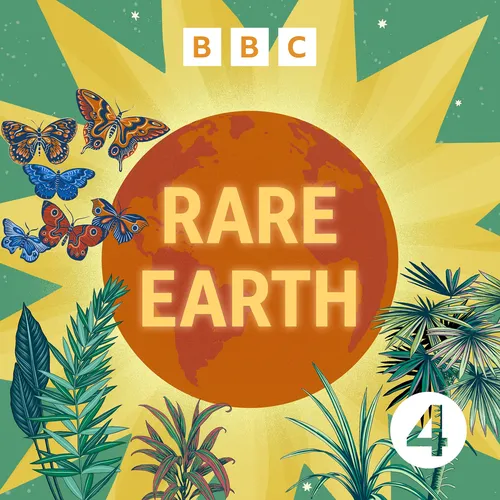
Rare Earth
Environmental journalist Tom Heap and physicist Helen Czerski tackle major stories about our environment and wildlife, celebrate the wonder of nature and meet the people determined to keep it wonderful.
- Update frequency
- every 7 days
- Average duration
- 52 minutes
- Episodes
- 44
- Years Active
- 2024 - 2025

Engineering the Planet
Efforts to reduce our carbon emissions are falling far short of what’s necessary to keep our temperature rise below 2 degrees centigrade. Is it time to seriously consider another option- using techn…

Creatures of the Night
A celebration of the wildlife that works while we sleep. Tom Heap and Helen Czerski explore the world of animals that provoke fear and wonder in equal measure.
Producer: Emma Campbell
Rare Earth is pr…

The Risk Takers
Can the insurance industry save the planet? With the nod from insurance companies a must for everything from coal mines to new homes, is the industry ready and willing to wield its power?
When huge s…

After the Bomb
80 years since the dropping of the first atomic bomb on Hiroshima, Tom Heap and Helen Czerski ask how our relationship with nuclear power has evolved.
At 8.15 on the morning of the 6th of August 1945 …

A Whale's Life
A ban on commercial hunting for whales came into force 40 years ago. Tom Heap and Helen Czerski look back on the whaling industry with one of the last of Shetland's whalers and ask if our largest mam…

Metals and Minerals
The transition to an economy based on renewable energy and electric cars needs huge quantities of materials like copper and rare earth metals. Sourcing them can be a problem. Mining damages the sur…

Powering Our Robot Overlords
Datacentres are big business, and vast numbers of them are being built around the world. In the UK, Amazon has announced plans to invest £8bn over the next five years building new datacentres, £3bn h…

Is Net Zero a toxic brand?
In 2019 the UK made a commitment to reach net zero carbon emissions by 2050. Since then the political consensus has broken down and analysts doubt that current government policy has any chance of re…

Are insects the answer?
Insects are the quiet engineers of the environment - pollinating our plants, balancing our ecosystems and clearing up our waste. Some insects can digest plastic, and they play a vital role in crop pr…

Set in Concrete
From ancient Rome onwards our civilisation has been built on concrete. It's incredibly useful but emits huge quantities of carbon dioxide in its production. What are the alternatives? Tom Heap and He…

Paradise on the Edge
The islands of the Pacific Ocean are on the frontline of climate change. Sea level rise will eventually erase some from the map and make many more uninhabitable. Tom Heap and Helen Czerski hear fro…

How to Clean Up the Shipping Industry
The shipping industry is an enormous source of pollution. Ships burn dirty fuel oil that helps contribute to the industry's global carbon emissions and even in port they continue to belch out noxiou…

Forever Chemicals
PFAS chemicals are all around us. They're used in frying pans, food packaging and waterproof coats but they have been linked to thyroid disease, liver damage and cancer. The trouble is that PFAS ju…

The Hole That Changed the World
40 years ago a hole was discovered in the ozone layer. It provoked an international effort to ban the chemicals that were destroying our protection from the sun. Tom Heap and Helen Czerski are join…

Cry Wolf
The wolf has mounted an extraordinary comeback. Once hunted to extinction across Western Europe, the wolf has taken advantage of the collapse of the Iron Curtain and the depopulation of the countrys…

Arctic Goldrush
For the Arctic, 2024 was the second-warmest year on record, with temperatures rising much faster than the global rate. The region's resources- oil, gas, iron ore, uranium, even diamonds and the rare …

Reasons To Be Cheerful
Could 2025 be a year of progress on climate change and the nature crisis? Tom Heap and Helen Czerski search for some tentative green shoots with former Green MP Caroline Lucas, editor in chief of Bu…

Christmas Trees
An ancient Babylonian text, Hammurabi’s Code of Laws, forbids the cutting down of street trees without permission. Nearly 4000 years later, threats to our urban trees still arouse the strongest pass…

Good Clean Fun
With fans travelling halfway across the country, stars expecting first class flights and venues serving up beefburgers and drinks in plastic cups the worlds of professional sport and live music share…

Amazon Future
It's been a hard year for the Amazon rainforest. The toughest drought on record has helped spread fires that have been the worst in two decades. That combination has hit the local people. “If these…